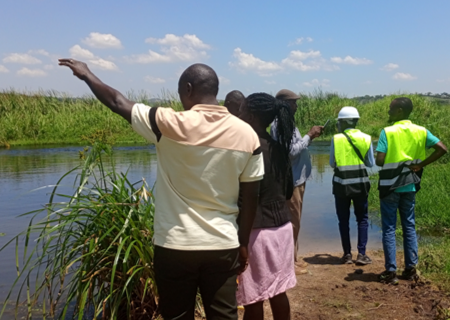Climate-Smart Farming: How Uganda Climate Smart Agricultural Transformation Project (UCSATP) Is Transforming the Lives of Gomba’s Farmers
Climate-Smart Farming: How Uganda Climate Smart Agricultural Transformation Project (UCSATP) Is Transforming the Lives of Gomba’s Farmers
By Kimera Hannington Communications Office, Gomba District
In the gently undulating green hills of Gomba District, a new sense of hope is spreading across the farmland. Through the Uganda Climate Smart Agricultural Transformation Project (UCSATP), farmers are not just improving their yields ,they are strengthening their resilience to the changing climate and taking charge of their futures. The district, one of 69 to benefit under the programme, has seen more than 11,700 farmers across seven sub-counties, two town councils and 49 parishes mobilised and linked to climate-smart interventions.
The mission is clear and powerful: to boost productivity, improve access to markets, and build resilience in key value chains such as coffee, livestock, fisheries and beneficial insects like bees and the black soldier fly.
“Before this project, farming felt like a gamble,” says Posiano Lwasa, a coffee farmer from Kabulasoke. “Now, we are trained, organised, and even have savings as a group. The future finally looks secure.”
At the heart of UCSATP’s progress in Gomba is its community-driven approach. District and sub-county level trainings and mobilisation have empowered farmer groups to form cooperatives, open bank accounts, and draw up production plans in line with the 20% co-funding requirement. To date, 40 production plans — spanning coffee, dairy, beef, fish and beneficial insects — have been approved, and most groups have already raised their share of the co-funds.
In parallel, the district has coordinated stakeholder meetings, verification exercises for farm access roads, and environmental assessments — ensuring that every step aligns not only with higher yields but sustainable practices and market linkages. Infrastructure projects such as the Kyebumba-Kasambya (8 km) road and the Sembula swamp crossing (0.5 km) are already at procurement stage, promising to ease transport of produce to buyers.
“When market days come, animals are transported via long routes to be sold off,” recalls Mr Serwano, LC III of Kifampa Sub-County. “Now, because of UCSATP the roads (Kawula-Maddu / Kibimba) will be worked on this will help us take produce and livestock to buyers without delay. It’s a big relief.”
Across Gomba the enthusiasm is tangible. From dairy farmers in Maddu to aquaculture innovators, the project is stirring a wave of productivity. Forty-nine farmer groups have been profiled and eight farmers have already been verified for infrastructure support — from irrigation systems to fish ponds and community watering points. The District and Sub-County Implementation Teams are providing essential technical support, visibility, accountability and coordination.
The project’s presence is felt in local radio talk shows, community meetings and the daily stories of farmers finding new purpose through climate-smart practices. Yet the journey has not been without obstacles. Delays in funding releases and shifting project guidelines have at times slowed implementation. Some capable farmer groups fall outside the selected sub-counties and literacy gaps continue to hamper information flow — efforts are however underway to strengthen awareness and interpret manuals for accessibility.
Still, as Mr. Kiddu Ben, the UCSATP focal person in Gomba, observes: “Every meeting, every training, every enterprise improved takes us a step closer to a climate-smart Gomba.”
With inputs such as fertiliser, protective gear, herbicides, Jerseys and bulls, fish seeds, KTB hives and a renewed focus on pasture development and beneficial insect rearing now being applied this season, the seeds of transformation are clearly germinating. As dawn breaks over the farmlands of Kyayi, Maddu and Kabulasoke, farmers are no longer simply waiting for rain. They ar learning to work with it, adapt and thrive because of it.
Road choke connecting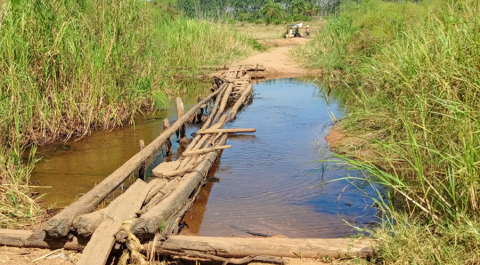 Kawula village to Maddu / Kibimba
Kawula village to Maddu / Kibimba
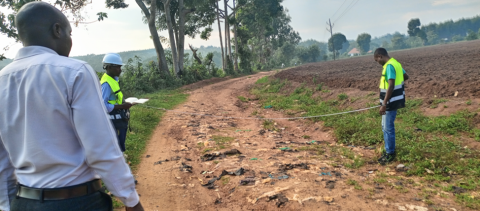
Engineers from MAAIF together with the community and district engineer Mr Mutyaba Herbert measuring the road for which is to be rehabilitated for ease of transportation as a means to ensure the sustainability under under the UCSATP program
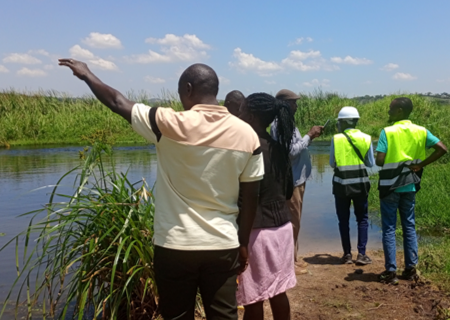
Engineers from MAAIF together with the community and district engineer Mr Mutyaba Herbert inspeciting the road choke along Kibimba river that connects Maddu to Kifampa the road for which is to be rehabilitated for ease of transportation as a means to ensure the sustainability under under the UCSATP program
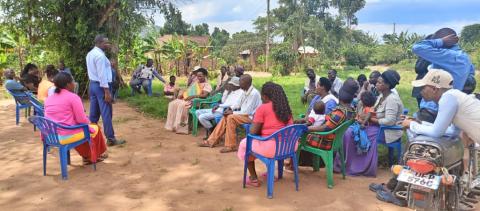
The LC111 Kifampa Sub county Mr Serwano Engaging the community of Kawuula Kifampa on the rehabilitation of road chokes under the UCSATP program
